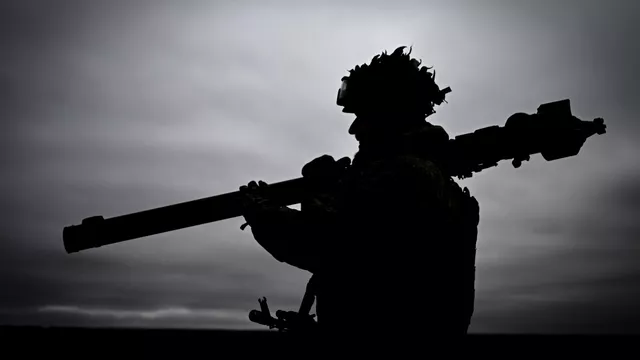Russia’s Battlegroup Tsentr liberated Progress and Yevgenovka villages in the Donetsk People’s Republic, the Russian Ministry of Defense (MoD) said on Sunday.
"Units of Battlegroup Tsentr have liberated the settlements of Progress and Yevgenovka in the Donetsk People's Republic through active combat operations," the ministry said.
Battlegroup Zapad defeated formations of three Ukrainian brigades and repelled a counterattack, resulting in losses of up to 540 Ukrainian soldiers, the MoD stated.
"The Ukrainian armed forces lost up to 560 servicemen, a tank, a US-made M113 armored personnel carrier and two vehicles [in battles with Russia's Battlegroup Yug]," the ministry also said in a statement.
As a result of operations by Russia's Battlegroup Vostok, Kiev lost up to 140 soldiers in the past 24 hours, along with a US-made M113 armored personnel carrier, five vehicles, a UK-made 155mm FH-70 howitzer and a 152mm D-20 gun-howitzer, the statement read.
Russia's Battlegroup Sever repelled two counterattacks in the area of the settlements of Volchansk and Glubokoye in the Kharkov region in the past 24 hours, with Kiev losing up to 205 soldiers and an ammunition depot, the MoD concluded.
Russia’s Battlegroup Center liberates two communities in DPR over past day
Russia’s Battlegroup North inflicts 205 casualties on Ukrainian army over past day
Russia’s Battlegroup Center liberated the communities of Progress and Yevgenovka in the Donetsk People’s Republic (DPR) over the past day in the special military operation in Ukraine, the Russian Defense Ministry reported on Sunday.
"Battlegroup Center units liberated the settlements of Progress and Yevgenovka in the Donetsk People’s Republic in active operations," the ministry said in a statement.
Russia’s Battlegroup North inflicts 205 casualties on Ukrainian army over past day
Russia’s Battlegroup North struck three Ukrainian army brigades and inflicted roughly 205 casualties on enemy troops in its area of responsibility over the past day in the special military operation in Ukraine, the Russian Defense Ministry reported on Sunday.
"Battlegroup North units inflicted damage on manpower and equipment of the Ukrainian army’s 115th mechanized, 92nd assault and 71st infantry brigades in areas near the settlements of Volchansk, Tikhoye and Velikiye Prokhody in the Kharkov Region. During the last 24-hour period, they repelled two counterattacks near the settlements of Volchansk and Glubokoye in the Kharkov Region. The enemy lost as many as 205 personnel. An ammunition depot was destroyed," the ministry said in a statement.
Russia’s Battlegroup West inflicts 540 casualties on Ukrainian army over past day
Russia’s Battlegroup West inflicted roughly 540 casualties on Ukrainian troops and destroyed a US-made armored vehicle in its area of responsibility over the past day in the special military operation in Ukraine, the Russian Defense Ministry reported on Sunday.
"Battlegroup West units improved their forward edge positions and inflicted casualties on formations of the Ukrainian army’s 116th mechanized, 117th territorial defense and 1st National Guard brigades in areas near the settlements of Tabayevka and Kupyansk-Uzlovoi in the Kharkov Region and Krasny Liman in the Donetsk People’s Republic. They repelled a counterattack by an enemy assault group near the settlement of Torskoye in the Donetsk People’s Republic," the ministry said in a statement.
The Ukrainian army’s losses in that frontline area over the past 24 hours amounted to 540 personnel, a US-made Stryker armored personnel carrier and 16 motor vehicles, the ministry specified.
In counterbattery fire, Russian troops destroyed two US-made 155mm M777 howitzers, a Polish-made 155mm Krab self-propelled artillery system, a 155mm Bogdana self-propelled artillery gun and two Anklav-N electronic warfare stations, it said.
In addition, Russian forces destroyed eight ammunition depots of the Ukrainian army, the ministry said.
Russia’s Battlegroup South strikes five Ukrainian brigades over past day
Russia’s Battlegroup South struck five Ukrainian army brigades and inflicted roughly 560 casualties on enemy troops in its area of responsibility over the past day in the special military operation in Ukraine, the Russian Defense Ministry reported on Sunday.
"Battlegroup South units gained more advantageous positions and inflicted damage on manpower and equipment of the Ukrainian army’s 24th and 54th mechanized, 79th air assault and 46th airmobile brigades and 12th Azov special operations brigade [outlawed in Russia as a terrorist organization] near the settlements of Kurakhovo, Katerinovka, Konstantinovka, Serebryanka and Verkhnekamenskoye in the Donetsk People’s Republic. The Ukrainian army’s losses amounted to 560 personnel, a tank, a US-made M113 armored personnel carrier and two motor vehicles," the ministry said in a statement.
In counterbattery fire, Russian troops destroyed a US-made 155mm M109 Paladin self-propelled artillery system, a US-manufactured 155mm M777 howitzer, a US-made 155mm M198 howitzer, a British-made 155mm FH70 howitzer, two 152mm D-20 howitzers, a 152mm Msta-B howitzer, a US-made 105mm M119 artillery gun and an Anklav-N electronic warfare station, it specified.
During the last 24-hour period, Russian troops destroyed two ammunition depots of the Ukrainian army, it said.
Russia’s Battlegroup Center inflicts 385 casualties on Ukrainian army over past day
Russia’s Battlegroup Center repelled three Ukrainian army counterattacks and inflicted roughly 385 casualties on enemy troops in its area of responsibility over the past day in the special military operation in Ukraine, the Russian Defense Ministry reported on Sunday.
Battlegroup Center units "inflicted casualties on formations of the Ukrainian army’s 28th, 31st and 32nd mechanized and 142nd infantry brigades in areas near the settlements of Dimitrov, Novogrodovka, Dzerzhinsk, Belaya Gora and Zhelannoye in the Donetsk People’s Republic. They repelled three counterattacks by enemy assault groups. The Ukrainian army lost as many as 385 personnel and five motor vehicles," the ministry said in a statement.
In counterbattery fire, Russian troops destroyed two US-made 227mm M270 MLRS rocket launchers, two 122mm D-30 howitzers, two 100mm Rapira anti-tank guns and a US-manufactured AN/TPQ-50 counterbattery radar station, it specified.
Russia’s Battlegroup East inflicts 140 casualties on Ukrainian army over past day
Russia’s Battlegroup East struck three Ukrainian army brigades and inflicted roughly 140 casualties on enemy troops in its area of responsibility over the past day in the special military operation in Ukraine, the Russian Defense Ministry reported on Sunday.
"Battlegroup East units improved their frontline positions and inflicted damage on manpower and equipment of the Ukrainian army’s 72nd mechanized, 102nd and 104th territorial defense brigades in areas near the settlements of Ugledar in the Donetsk People’s Republic, Gulyaipole and Novodarovka in the Zaporozhye Region," the ministry said in a statement.
The Ukrainian army’s losses in that frontline area over the past 24 hours amounted to 140 personnel, a US-made M113 armored personnel carrier, five motor vehicles, a British-made 155mm FH70 howitzer and a 152mm D-20 howitzer, it specified.
Russian troops also destroyed three ammunition depots of the Ukrainian army, it said.
Russia’s Battlegroup Dnepr strikes three Ukrainian army brigades over past day
Russia’s Battlegroup Dnepr struck three Ukrainian army brigades and inflicted roughly 100 casualties on enemy troops in its area of responsibility over the past day in the special military operation in Ukraine, the Russian Defense Ministry reported on Sunday.
"Battlegroup Dnepr units inflicted casualties on formations of the Ukrainian army’s 128th mountain assault, 141st infantry and 35th marine infantry brigades in areas near the settlements of Rabotino in the Zaporozhye Region, Tyaginka and Ponyatovka in the Kherson Region," the ministry said in a statement.
The Ukrainian army’s losses in that frontline area over the past 24 hours amounted to 100 personnel, two US-made 155mm M777 howitzers, two 152mm D-20 howitzers and a 122mm D-30 howitzer, it specified.
In addition, Russian troops destroyed an ammunition depot of the Ukrainian army, it said.








